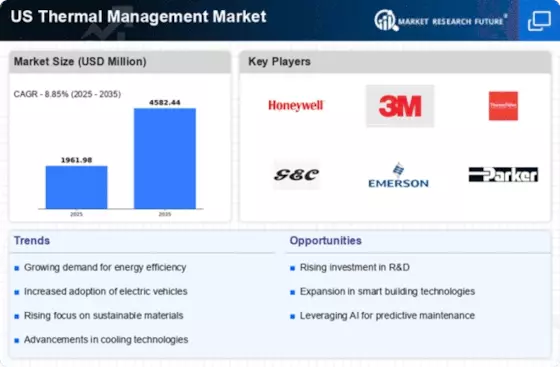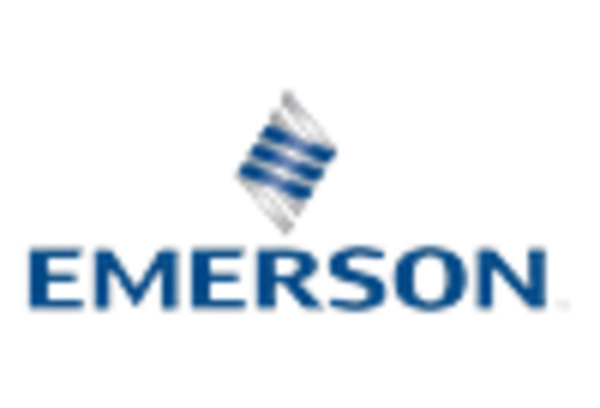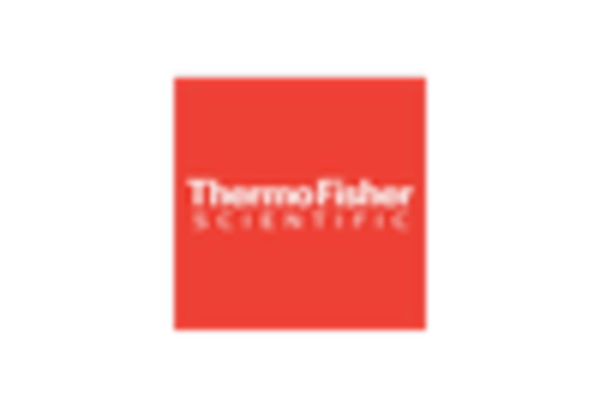Growth in Data Center Infrastructure
The expansion of data centers across the United States is a critical driver for the US Thermal Management Market. As businesses increasingly rely on cloud computing and big data analytics, the demand for efficient thermal management solutions in data centers has surged. According to recent estimates, the data center market in the US is expected to reach over 100 billion USD by 2026. This growth necessitates advanced cooling technologies to manage heat generated by high-density server configurations. Consequently, companies are investing in thermal management systems that enhance energy efficiency and reduce operational costs, thereby propelling the market forward.
Rising Adoption of Renewable Energy Sources
The US Thermal Management Market is experiencing a notable shift towards renewable energy sources, such as solar and wind power. This transition necessitates advanced thermal management solutions to optimize energy efficiency and maintain system performance. As the US government continues to promote renewable energy through various incentives and policies, the demand for effective thermal management systems is likely to increase. For instance, the implementation of the Inflation Reduction Act has spurred investments in clean energy technologies, which in turn drives the need for innovative thermal management solutions. The market for thermal management in renewable energy applications is projected to grow significantly, reflecting the broader trend of decarbonization in the energy sector.
Advancements in Automotive Thermal Management
The automotive sector in the US is undergoing a transformation, with a growing emphasis on thermal management technologies. The US Thermal Management Market is likely to benefit from the increasing complexity of vehicle designs, particularly with the rise of electric and hybrid vehicles. These vehicles require sophisticated thermal management systems to ensure optimal battery performance and safety. The market for automotive thermal management solutions is projected to grow at a compound annual growth rate (CAGR) of approximately 8% through 2026. This growth is driven by the need for improved energy efficiency and the integration of advanced materials and technologies in vehicle manufacturing.
Regulatory Compliance and Environmental Standards
The US Thermal Management Market is significantly influenced by stringent regulatory compliance and environmental standards. The Environmental Protection Agency (EPA) and other regulatory bodies have established guidelines that mandate energy efficiency and emissions reductions across various sectors. As industries strive to meet these regulations, the demand for effective thermal management solutions is expected to rise. Companies are increasingly adopting thermal management technologies that not only comply with regulations but also enhance overall operational efficiency. This trend is likely to drive innovation in the market, as businesses seek to develop sustainable practices while adhering to environmental standards.
Increased Focus on Energy Efficiency in Industrial Applications
The industrial sector in the US is placing a heightened emphasis on energy efficiency, which is a key driver for the US Thermal Management Market. Industries such as manufacturing, oil and gas, and pharmaceuticals are actively seeking thermal management solutions that minimize energy consumption and reduce operational costs. The US Department of Energy has launched initiatives aimed at promoting energy efficiency in industrial processes, further stimulating demand for advanced thermal management systems. As industries adopt these technologies, the market is expected to witness substantial growth, driven by the need for sustainable practices and cost-effective solutions.















